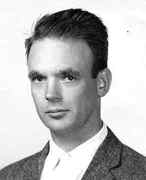Person: Higman (2), Donald

Donald Higman was an Canadian mathematician best known for his work in group theory and in particular for the discovery of one of the sporadic simple groups.
Mathematical Profile (Excerpt):
- Leslie Higman was born in St Columb, Cornwall, England on 24 December 1899.
- Higman was educated in Vancouver where, after graduating from High School, he entered the University of British Columbia.
- She spent 1948 as a visiting lecturer at the University of British Columbia and during that year she lectured to Higman.
- She almost certainly made this suggestion knowing that Higman was enthusiastic about algebra and that Reinhold Baer held a chair there.
- Higman received his B.A. degree in 1949 from the University of British Columbia and, having been accepted for the University of Illinois graduate school, began his studies there advised by Baer.
- While at the University of Illinois Higman made a number of important contacts, the two most important being Michio Suzuki and Hans Zassenhaus.
- Hans Zassenhaus had accepted a chair at McGill University, Montreal, in 1949 and Higman met him at a Canadian summer mathematics program in either 1951 or 1952.
- After Higman graduated with his Ph.D., he was able to spend the two years 1952-54 at McGill University funded by a National Research Council Fellowship.
- Higman's theory of the focal subgroup of a Sylow subgroup was a basic tool in local analysis in finite group theory.
- Higman states that those results follow from the focal subgroup theory.
- Brauer was impressed with Higman, and this may have influenced Don's success in getting a job at the University of Michigan (for Brauer had been a member of the University of Michigan faculty during 1948-1951 before moving to Harvard).
- The second of the above mentioned four papers, Modules with a group of operators (1954), contains the important definition of a relatively projective (or injective) module for the group algebra of a finite group and proves the famous criterion for relative projectivity that is today named for him, being known as 'Higman's criterion'.
- Higman played a large role in creating an extremely friendly atmosphere in the Mathematics department at Michigan, where there were many parties and constant forms of hospitality.
- In 1967 Higman made a major breakthrough when, working with Charles Sims, he discovered the previously unknown sporadic simple group now known as the Higman-Sims group.
- Let us note here that Charles Sims had been an undergraduate at the University of Michigan and had been taught algebra by Higman.
- Both Higman and Sims were at the conference 'Computational Problems in Abstract Algebra' held in Oxford in that year.
- Using Higman's theory of rank-3 groups, they constructed the Higman-Sims group as a primitive permutation group of degree 100, with order 44,352,000 and rank 3.
- Higman and Sims described the group in the paper A simple group of order 44,352,000 which appeared in Mathematische Zeitschrift in 1968.
- the Higman-Sims group, was found without any recourse to computation at all.
- Indeed, from my point of view, Higman and Sims were the two people who introduced graph theory into the study of permutation groups.
- However, my strongest early memories of Higman are from a two-week meeting in Japan in 1974 organized by Michio Suzuki.
- At the University of Michigan, Higman served on many departmental committees including the executive committee, the doctoral committee, and the master's committee.
- Over the years Higman made many visits abroad to conferences and other events.
- In June 1966 he was in Japan and, in that month, gave the lecture 'Remarks on Finite Permutation Groups' at the University of Tokyo in which he described the discovery of Janko's simple group and discussed Donald Livingstone's construction of it.
- Among the many honours given to Higman, we note especially his invitation to lecture at the International Congress of Mathematicians in Nice in 1970 when he lectured on his theory of rank-3 groups.
- Professor Higman had cancer and volunteered to be part of an experimental research study at the University of Michigan Comprehensive Cancer Center, contributing in whatever way he could to find a cure for the disease.
- In February 2009 the Michigan Mathematics Journal produced a special memorial issue for Donald Higman.
Born 20 September 1928, Vancouver, British Columbia, Canada. Died 13, February, 2006, Ann Arbor, Michigan, USA.
View full biography at MacTutor
Tags relevant for this person:
Group Theory, Origin Canada
Thank you to the contributors under CC BY-SA 4.0! 

- Github:
-

- non-Github:
- @J-J-O'Connor
- @E-F-Robertson
References
Adapted from other CC BY-SA 4.0 Sources:
- O’Connor, John J; Robertson, Edmund F: MacTutor History of Mathematics Archive
